Chad Holds General Election Amidst Boycott and Low Voter Turnout

Chad’s general election on Sunday faced low voter turnout due to a boycott by opposition parties, which argued the results were predetermined. President Deby emphasized the election’s significance amidst skepticism about electoral integrity, with citizens expressing disillusionment regarding effective governance. The election marks a pivotal point in Chad’s effort to transition from military rule to democracy, presenting challenges linked to security, socio-economic issues, and climate change.
Chad held a general election on Sunday aimed at transitioning from military rule, yet voter turnout was reported to be low amid a boycott called by opposition parties. Early midday estimates indicated only a 38 percent participation rate as Chadians opted to stay home, adhering to calls from opposition leaders who contested the legitimacy of the elections. Opposition figures, like Succes Masra of the Transformers party, criticized the elections, alleging that the outcomes had been predetermined, leading many citizens to perceive voting as futile.
President Mahamat Idriss Deby Itno, who ascended to power following a military takeover in 2021, urged citizens to participate in the election, branding it a historic opportunity. However, skepticism abounds, as some voters, like Patrice Lumumba Deoumoundou, expressed disillusionment with the lack of effective change in governance and systemic expectations of equality and justice. While military and police personnel reportedly recorded a higher turnout rate of over 72 percent, community representatives highlighted local issues exacerbated by climate change as vital concerns that the newly elected officials must address.
Despite the contentious atmosphere surrounding the elections, the government maintains that these elections are a critical step toward establishing a democratic framework. The historical backdrop features a significant legacy of Ferdinand Deby, who ruled Chad for three decades until his demise, prompting a reevaluation of governance structures in the Sahel region. Combined with the compounding effects of security challenges, including assaults from Boko Haram, the need for substantial reforms remains urgent as Chad navigates its complex transition.
Following the death of former President Idriss Deby in 2021, Chad has experienced significant political upheaval, transitioning from a longstanding dictatorship to a military-led governance model. The new leadership, recognizing the pressing need for democratic reforms, has scheduled elections as part of a broader strategy to return to civilian rule. Nevertheless, opposition factions have criticized both the electoral process and the legitimacy of the military government’s authority, accusing it of undermining democratic values and maintaining control through manipulated processes. The call for a boycott reflects deep-rooted distrust among the populace regarding election integrity and the efficacy of political participation in a climate fraught with instability and violence from extremist groups. Furthermore, persistent socio-economic challenges, including poverty and climate-related issues, complicate the electoral landscape as citizens demand tangible improvements in their living conditions.
In summary, the recent elections in Chad signify a critical juncture in the nation’s political evolution, reflecting ongoing tensions between military authority and the quest for democratic governance. Low voter turnout, primarily influenced by a boycott from opposition parties and widespread voter apathy, underscores the challenges the government faces in legitimizing its rule. As the nation grapples with multifaceted issues, including armed violence and economic strife, the need for a robust democratic framework remains more crucial than ever to ensure a stable future for Chad.
Original Source: www.wyomingnewsnow.tv






